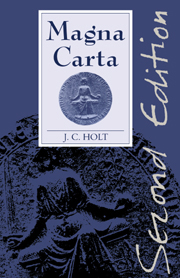Book contents
- Frontmatter
- Dedication
- Contents
- List of plates
- Preface
- Preface to second edition
- Acknowledgements
- Abbreviations
- 1 The Charter and its history
- 2 Government and society in the twelfth Century
- 3 Privilege and liberties
- 4 Custom and law
- 5 Justice and jurisdiction
- 6 Crisis and civil war
- 7 Quasi Pax
- 8 The quality of the Great Charter
- 9 The achievement of 1215
- 10 From distraint to war
- 11 The re-issues and the beginning of the myth
- Appendices
- References
- Index
4 - Custom and law
Published online by Cambridge University Press: 05 October 2014
- Frontmatter
- Dedication
- Contents
- List of plates
- Preface
- Preface to second edition
- Acknowledgements
- Abbreviations
- 1 The Charter and its history
- 2 Government and society in the twelfth Century
- 3 Privilege and liberties
- 4 Custom and law
- 5 Justice and jurisdiction
- 6 Crisis and civil war
- 7 Quasi Pax
- 8 The quality of the Great Charter
- 9 The achievement of 1215
- 10 From distraint to war
- 11 The re-issues and the beginning of the myth
- Appendices
- References
- Index
Summary
Resistance to the abuse of monarchical power in the twelfth and thirteenth centuries was based on assumptions which permeated the society of western Europe. Magna Carta was more than a simple reaction against Angevin government, and more than a Statement of the privileges which the Angevins had made available; it was also a Statement of principles about the organization of a feudal state. As such it drew on a common body of experience and custom which, with local variants, was shared throughout western Europe and the Latin states in the east. Hence the Norman and Angevin kings had to contend with men who shared strong views on the constitution of society, on title to feudal property, on the right to judgement and on the proper conduct of lords and kings. The Angevins gave their men the grievances and the education in government which were woven into the tapestry of Magna Carta. But the warp and weft were derived from the structure of society itself.
This common experience was embodied in custumals and law-books, it was formulated in statutes, it was sharpened by the conflict between Church and State, it was laid down as assizes when new states were founded, and it was stated in Charters of liberties when the interaction of royal policy and aristocratic interests exploded into political crises. Together these scattered and widely different sources reveal legal and political principles of remarkable permanence and pervasiveness.
- Type
- Chapter
- Information
- Magna Carta , pp. 75 - 122Publisher: Cambridge University PressPrint publication year: 1992



